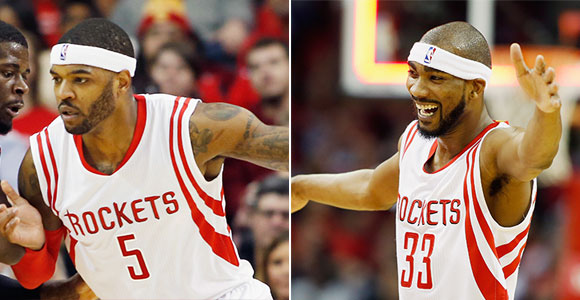Houston Rockets
Houston Rockets Salary Cap Update
David Weiner breaks down the Houston Rockets salary cap situation as they head towards the NBA Trade Deadline next month and explains why keeping Josh Smith beyond this season will be tough.
Published
11 years agoon
Back in October, I wrote that (a) the Houston Rockets had enough room to use the Jeremy Lin trade exception, possibly the Bi-Annual Exception (BAE) and still use salary matching rules to take on additional salary and (b) the luxury tax would not be a significant deterrent for Rockets owner Leslie Alexander.
Well, Rockets GM Daryl Morey has been busy following this very plan.
On December 19, Houston acquired Corey Brewer and Alexey Shved in a three-team trade with the Minnesota Timberwolves and Philadelphia 76ers, with the Rockets surrendering Troy Daniels and three second round picks in the process. This trade was made possible by utilizing the Lin trade exception to absorb both Brewer’s and Shved’s (mid-sized) salaries without having to comply with the league’s normal salary-matching rules. By consummating this trade as they did, Brewer and Shved will each be eligible to have their salaries aggregated with those of other Rockets players in trade packages on the NBA’s February trade deadline.
Then, just one week later, the Rockets signed Josh Smith to a one-year deal for the BAE after Smith was bizarrely waived by the Detroit Pistons. A talented but troubled player was acquired for a song compared to his market value, thanks in no small part to Smith’s large guaranteed salary still being paid by Detroit. Houston was able to outbid other contending teams because it did not spend its BAE during the offseason. (As a free agent signing who will have been with his new team for less than 3 months as of the February trade deadline, Smith is ineligible to be traded during this season.)
To make room for Smith, Houston waived Tarik Black. Black, who had done an admirable job manning the middle for the Rockets while Dwight Howard was out with injury, was the obvious (financial) choice to be cut, since his salary was mostly non-guaranteed. When the Los Angeles Lakers claimed Black on waivers, the roughly $180,000 of his salary that would have otherwise remained on Houston’s books was cleared.
With these transactions completed, it’s time to once again take a look at the team’s current salary cap situation and where the Rockets can go from here.
Player Salary, Exceptions and Available Cap Room
(Salaries and contract information courtesy of ShamSports.com and some good old-fashioned digging.)
The Houston Rockets currently have the following player salary commitments, cap holds and salary cap exceptions available for the 2014-15 season:
Player salary commitments:
Howard ($21.44 million), James Harden ($14.73 million), Trevor Ariza ($8.58 million), Jason Terry ($5.85 million), Kostas Papanikolaou ($4.8 million), Brewer ($4.7 million), Shved ($3.28 million), Josh Smith ($2.08 million), Terrence Jones ($1.62 million), Donatas Motiejunas ($1.48 million), Clint Capela ($1.19 million), Joey Dorsey ($948,163), Patrick Beverley ($915,243, non-guaranteed), Isaiah Canaan ($816,482) and Nick Johnson ($507,336), along with guaranteed money owed to Jeff Adrien ($915,243), Francisco Garcia ($915,243), Ish Smith ($915,243*), Robert Covington ($150,000*) and Akil Mitchell ($150,000).
* Ish Smith (Oklahoma City) and Covington (Philadelphia) each signed deals with new teams and are eligible to have their salaries partially set off once their respective new deals become guaranteed on January 10. This will result in some minor savings on both payroll and team salary, the latter of which should provide some welcome additional breathing room under the luxury tax threshold. (Adrien’s new deal with Minnesota is not large enough to make his Rockets salary eligible for set off.)
Cap holds: None.
Exceptions: With the Jeremy Lin trade exception amount whittled down to a practically unusable amount, the Rockets’ lone viable trade exception is a small, $816,482 one generated in the trade of Daniels to Minnesota. This trade exception could be used to acquire a player making the equivalent of the one-year veteran’s minimum but who is on a three- or four-year deal (meaning that he is ineligible to be acquired using the Minimum Player Salary Exception).
The Rockets are a little less than $1 million shy of the luxury tax threshold and nearly $5 million shy of the “apron” level that also acts as a hard cap for Houston this season.
Trade Season: Opportunities and Constraints
The Rockets have developed a sizable “middle class” (from a salary standpoint), which now consists of Ariza, Terry, Papanikolaou, Brewer, Shved and Smith.
While each of these players may end up as a key rotation piece for Houston, expect one, two or even three of these players (minus the ineligible Smith) to be shopped at the trade deadline as part of a package for a third star. (While Ariza is far less likely to be traded — both due to his integral impact on the Rockets’ defense and the size of his contract — the fantastic early play of Brewer may make moving Ariza at least a little more plausible.)
Although the Lin trade exception possessed value at the February trade deadline (as a more appealing avenue for another team to dump salary than to take on an expiring contract) or next July (either in trade or as a mechanism to facilitate certain sign-and-trade deals to acquire free agents from other teams), Morey and the Rockets elected to utilize that exception sooner rather than later. The chief benefit in doing so — aside from getting good players now — is that splitting it into two mid-sized contracts allows for more trade flexibility. A trade exception cannot be combined with other player salaries for salary-matching purposes; but come February 19, the salaries of Brewer and/or Shved can be.
While the Rockets have great flexibility in how they can structure trades over the next two months, there are new constraints facing them as well.
One such constraint is the more stringent salary-matching rules imposed against tax-paying teams. Teams whose total team salary would exceed the luxury tax threshold following completion of a given trade may only acquire a maximum of 125% of outgoing salary, plus $100,000. Teams who would fall below the tax threshold may acquire up to 150% of outgoing salary, plus $100,000 under many trade scenarios. But with Houston so close to the tax threshold already, and with the Rockets looking to acquire a high-caliber player whose team would not want to take on more salary than it is trading out, any notable trade would likely result in the Rockets venturing into luxury tax territory.
An even bigger constraint to the Rockets this trade season will be the hard cap itself. Houston cannot exceed the $80.829 million “apron” level at any point this season. There is no salary cap exception, 10-day contract or other veteran’s minimum signing of which the Rockets could avail themselves to exceed this cap. For example, if Houston sought to trade four players for one star player, with the Rockets taking on $4-5 million in additional salary in the process, there would be little (if any) room left under the hard cap for Houston to add a 13th player. If the prorated two-year veteran’s minimum salary at that point in the season is greater than the Rockets’ remaining room under the hard cap, this hypothetical trade would be prohibited by the league office.
2015 Cap Room
Assuming the currently projected 2015-16 cap figure of $66.5 million ends up being accurate (more on that here), and assuming that no further trades are made, the Rockets could have about $7.6 million in available cap room next summer.
To get to this figure, Houston would need to renounce its rights to all free agents except for Beverley (who is inching closer to being due a $2.725 million qualifying offer for meeting the league’s “starter criteria”) and either trade away its 2015 first round pick(s) or have any such player(s) playing overseas next year. (Since the original publication of this article, I have learned that Brewer officially declined his 2015-16 player option.)
While the Rockets could always open up some additional room by trading away salary, it is unlikely that — barring a trade of Ariza for little to no salary in return — they could generate enough cap room to make a legit run at a star free agent this summer. Again, that assumes that the current projections remain intact.
This may explain why the Rockets seem to be going “all in” this season.
What To Do With Josh Smith After This Season?
Because the Rockets only signed Smith to a one-year deal, they will not have (full) Bird rights to re-sign him next summer. Houston will hold “Non-Bird rights” to Smith, which would allow the Rockets to exceed the salary cap to re-sign Smith to a starting salary of up to 120% of his prior salary (in this case, about $2.49 million). If Smith — who is due to receive about $5.4 million annually from the Pistons through 2019-20 — would be willing to accept this amount, that would be the most ideal scenario for the Rockets (short of Smith taking the veteran’s minimum salary). But don’t expect Smith to be overly charitable in this regard.
Another option is to use the Mid-Level Exception (MLE) on Smith. The Taxpayer MLE amount next year is $3.376 million, which the Rockets could pay without having to face many other cap restrictions. The Non-Taxpayer MLE amount next year is $5.464 million. Houston could pay this larger amount but would then once again become subject to a hard cap at the “apron” level.
The only way for the Rockets to be able to pay Smith more than the Non-Taxpayer MLE amount would be for Houston to create enough salary cap room to do so. But this would require renouncing rights to several of their own free agents, losing other salary cap exceptions and otherwise constraining the Rockets’ ability to (re)construct their roster.
The options for re-signing Smith seem to get less and less palatable the higher the amount becomes. Here’s hoping Smith’s play this season will make the decision as difficult as possible for Morey and company.
Conclusion
After a series of moves, the Rockets have built themselves a nice middle class, which should help them both on the court and in mid-season trades. Unless the league’s salary cap projections for next season change dramatically, expect Morey to be aggressive in his attempts to add another major contributor to this roster by the February trade deadline. While the team must maneuver around and under the constraints of dealing with the luxury tax and the hard cap, do not expect Alexander to be deterred by the prospect of cutting a luxury tax check to the league after this season.
The Rockets are very much in “win now” mode. We’ll just have to wait and see what opportunities present themselves between now and February 19 for Houston to further vault itself up another branch on the very crowded championship contender tree.
You may like
Houston Rockets
Looking Back on the Trade for Phoenix’s Draft Picks
Are the Rockets set to cash in on Phoenix’s downfall or could a Suns retool murky the waters?
Published
4 months agoon
March 12, 2025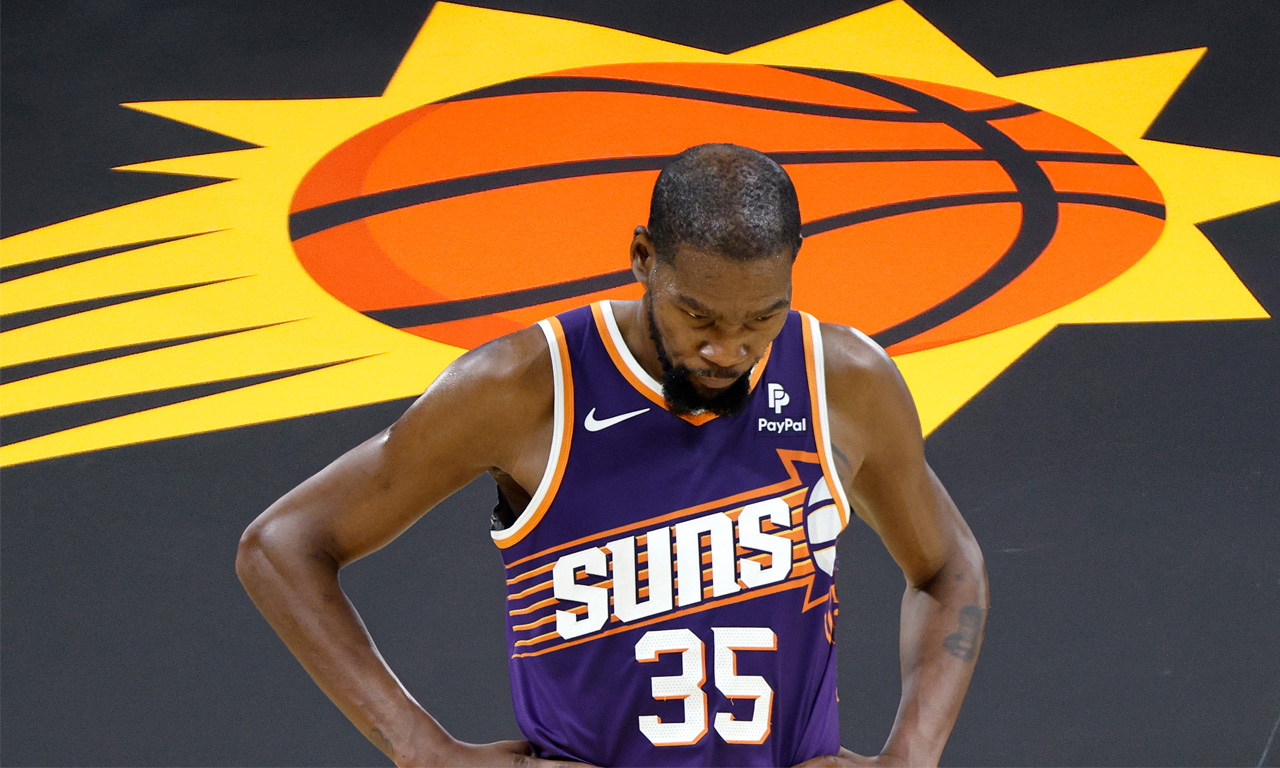
As the Houston Rockets set to host the Phoenix Suns tonight, it seems the right time to take a look back at the trade that linked these two franchises together for the foreseeable future.
This past June, the Rockets made a trade with Brooklyn that sent back to the Nets control of their 2025 and 2026 unprotected first-round picks. In exchange, the Rockets received a large chunk of Phoenix’s future (2025, 2027, 2029) and control of the Dallas Mavericks’ 2029 first.
In essence, the Rockets traded one pick and one swap for two picks and two swaps. All unprotected.
Thoughts At The Time of the Trade
If I’m going to discuss the current outlook of this trade, I have to be honest about how I saw it at the time of the move. While I didn’t hate this trade initially, I definitely didn’t love it either.
I liked that the Rockets increased their overall trade assets. I also liked that they extended the timeline to be able to make a bigger trade and I also appreciated that they kept control of the 2027 Brooklyn swap.
But I didn’t like that the Rockets gave up what seemed like the more established value (Brooklyn) for a more uncertain gamble (Phoenix). The Rockets did not control a “tanking runway” of picks to offer back to Phoenix — all of the picks Houston got in the deal were in staggered years (’25, ’27, ’29). I also felt Brooklyn, who badly needed to rebuild, got away with paying market value to get their picks back despite the fact that the Rockets invested years in watching those picks appreciate up to the point that they had the Nets completely over a barrel.
Net-net: I felt like more certainty was traded for less certainty and it was more of an equitable trade for both teams rather than Brooklyn paying dearly to get back the things only the Rockets could offer.
There were two ways I thought this trade could pay dividends: The Suns needed to flame out immediately, as in this season (unlikely), or the Rockets could trade all those pick assets as part of a deal for a real superstar in the next 12-18 months (more likely).
In a testament to how quickly change can occur in a very unpredictable NBA, four things have happened that have been positive indicators for the Rockets in making this move.
The Suns are fading
While Phoenix had major salary cap issues, dealing with the second apron, they didn’t appear to have problems on the court. They jumped out of the gate 8-1 and looked like a legitimate contender behind their star trio of scorers in Kevin Durant, Devin Booker and Bradley Beal.
Given Houston controlled Phoenix’s pick this year via a swap, it looked like the Rockets would come up empty-handed on the trade this season.
That changed quickly.
Injuries, serious depth concerns and a lack of a defensive identity has sent Phoenix spiraling. Booker’s availability has been inconsistent, forcing Durant to carry the load, while Beal has not quite fit in at all. Their financial limitations, thanks to owner Mat Ishbia’s all-in spending spree, have handcuffed their ability to improve the roster around the three stars.
The Suns are sitting 11th in the West, having gone 22-34 since that hot start, and are currently trying to catch a depleted Dallas squad to get back into the play-in picture.
As of right now, the Rockets project to end up with a lottery pick (albeit a late one) this season out of the trade.
Phoenix was caught shopping Durant
Because the Suns struggled so hard after the start, they tried to make a major move at the deadline but could not unload Beal, in large part due to his no-trade clause.
As a result, they may have made a misstep: They openly tried to trade Durant, which inevitably became public news.
Now? Durant will almost assuredly be traded this summer — likely to a destination that he handpicks. This means the Phoenix Suns will have to look at all possibilities for their future, including potentially having to give Rafael Stone and the Rockets front office a call.
But keep in mind, the Rockets can not offer Phoenix the ability to completely rebuild via the draft right now. Phoenix’s 2026 pick is controlled by Washington. They would have to get extremely creative to set that stage. A retool in Phoenix is much more likely.
Could Brooklyn have been better than expected?
This one is tougher to gauge.
The Brooklyn Nets are currently tied for fifth-worst team in the league, giving them strong lottery odds this summer. This was expected. After all, the Nets, even with a healthy Mikal Bridges and a full roster, were not a good team last season, closing the year 20-41 in the final three quarters of the season. The Rockets ended up with the #3 pick (Reed Sheppard) as a result of Brooklyn’s mediocrity.
However, if the Rockets had not placed that pick back in Brooklyn’s hands, would the Nets be better than this?
Brooklyn brought in a new coach in Jordi Fernandez that has had a positive impact. They have dumped off players, such as Dennis Schroeder and Dorian Finney-Smith, that impacted winning. The bar to make the play-in in the East (.415 winning percentage) is obscenely low, with Brooklyn being just five wins away from it at the moment.
And on top of that, Brooklyn did have lots of draft capital that they could have moved to try to win now.
It’s very tough to say as you don’t know if a team with Bridges still in Brooklyn might have actually been worse than this current squad, but you could make a case that the pick the Rockets would have ended up with from Brooklyn this season would be eerily similar to the one they will end up getting from Phoenix this year.
Again, this is a tough call.
Nico Harrison Hooked the Rockets Up
As part of the trade, the Rockets got control of the Dallas Mavericks’ 2029 first-round pick (unprotected, of course). While there’s really no way of knowing what a pick will be five years out, we did know that Luka Doncic would be just 29-30 years old that season and it was fairly etched in stone that he would be the core piece of a Dallas squad that season.
Enter chaos in Dallas.
Doncic was shipped out in the trade that shocked the world, which could have a major impact on the Rockets. Dallas’ current core of Kyrie Irving and Anthony Davis will be 37 and 36 years old that season, respectively.
On paper, the value of that pick shot up.
Final Summary
Right now, the outlook on these picks looks strong. One source stated off the record that they feel the 2029 Phoenix pick is the best pick asset out there that is owned by another team. The Rockets would be reluctant to add that one specifically into any trade unless it’s for a truly legitimate star.
But if there is any lesson that the NBA teaches us over and over again, it’s that it’s very hard to predict where a team will be a year from now, much less three years from now.
Can the Rockets pressure Phoenix and leverage the ownership they have of their draft capital to get what they really want (Booker) from them? Could a Suns retool around Booker and Beal, with the right pieces and assets acquired from a Durant trade, significantly change their on-court outlook and cap sheet — which in turn could damage the value of the picks Houston controls?
Bottom line is it has worked out well this season, and the future forecast at the moment is promising. The current value of those future picks appears strong. What will likely determine history’s final grade for this trade will be how it sets them up for the trade to come, and that’s where fans will be looking to Stone and the front office for action starting this summer.
Houston Rockets
Amen Thompson’s ankle injury will be re-evaluated in one week
“The things he does you can’t replicate,” says Rockets coach Ime Udoka
Published
4 months agoon
March 10, 2025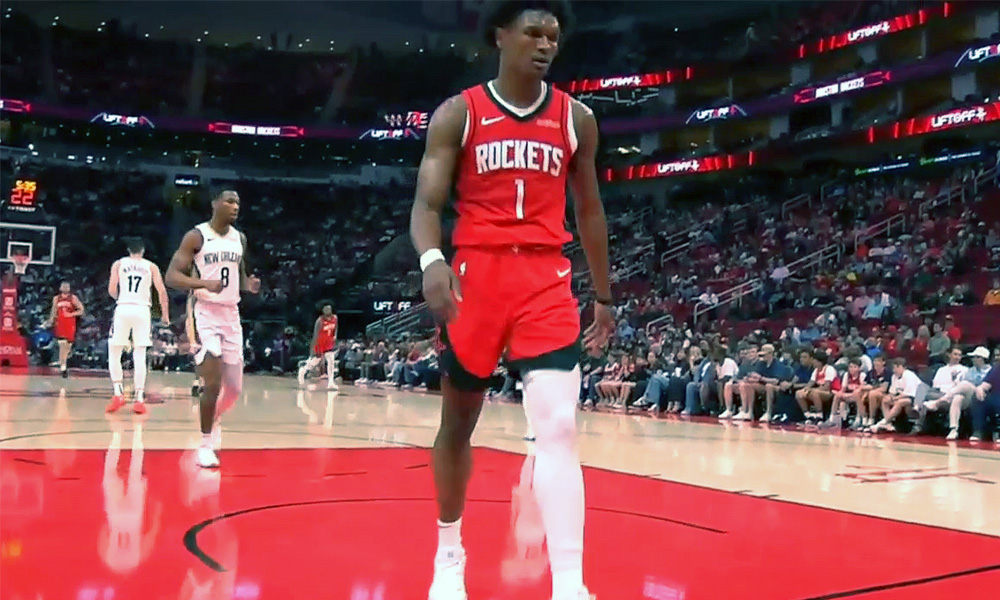
Rockets young star Amen Thompson will have his ankle injury re-evaluated in one week, according to Ime Udoka.
Thompson had an MRI on Sunday and the Rockets coach confirmed all imaging (X-ray, MRI) was negative.
“Just some swelling and pain, obviously,” said Udoka.
If you listen to Udoka, you can tell he knows how special Amen is to this team. He said the Rockets are missing a lot by not having him out there.
“Obviously, the things he does you can’t replicate,” said Udoka. “[Amen is] a guy that plays every position for us. When one goes down, he runs the point. If another is out, he runs the four.”
Amen is one of the best defensive players in the game, and as a one-on-one defender of guards/wings, he might already be the best in the league in just his second season. He’s holding his opponents to 40.5% shooting from the field, tops in the league.
“He’s a very unique defensive player,” said Udoka. “We got some guys that do some great things there, but I like to put him and Dillon on the best two usually, night to night. You got Tari and that’s a luxury as well, but the way he goes about it is different. His athleticism, size, speed, strength, shotblocking ability, steals… he’s all over the place.”
“Hard to replicate for sure.”
Amen injured his ankle late Saturday night in a blowout win against the Pelicans, but the unfortunate part was he probably should not have been on the floor in the first place.
The Rockets left Amen Thompson in the game in a blowout to get one more rebound for a triple-double and he just got injured. He's heading to the locker room with a limp. https://t.co/UBtrEpgWuU pic.twitter.com/D8GeKP8sQk
— ClutchFans (@clutchfans) March 9, 2025
The Rockets had built well over a 30-point lead by early fourth quarter. Jalen Green was able to rest the entire fourth. Alperen Sengun came out of the game with 7-8 minutes left while Dillon Brooks and Tari Eason came out with 6:00 left. But Thompson, who had posted an insane +39 on-off number, remained in the game because he was one rebound shy of a triple-double with 15 points, 11 assists and nine rebounds.
Udoka addressed that decision on Monday before the game against Orlando.
“What I typically don’t do is wholesale substitutions,” said Udoka of the decision to keep Amen in the game. “Albeit 30[-point lead] at six minutes [left] is different than losing to Minnesota, a 16-point lead with four minutes [left].”
“I’ve seen it go both ways in the past. You take out guys too early and have to bring starters back, and vice versa.”
Thompson has played in 60 games this season, five short of being eligible for postseason awards. He absolutely should be up for an All-Defensive nod this season so keep an eye on him getting back in time for that. He would need to return to action no later than April 4th for the game against the OKC Thunder in order to play enough games to be eligible.
Houston Rockets
How the Kyrie Irving Injury Impacts Rockets
Houston’s draft positioning and offseason plans could be impacted by Dallas
Published
4 months agoon
March 4, 2025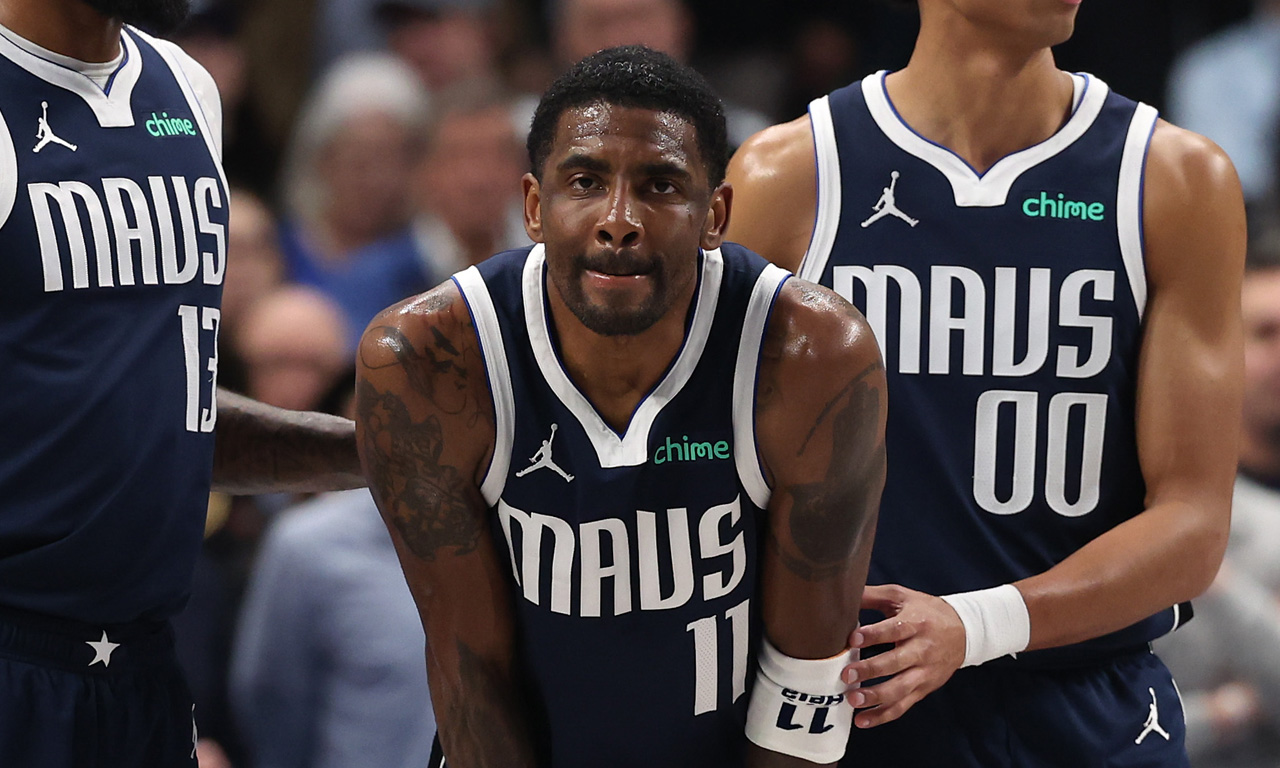
Dallas Mavericks guard Kyrie Irving was injured Monday night and the news dropped on Tuesday that the knee injury is serious — a torn ACL in his left knee that will end his season and a good portion of next season as well.
Brutal. I can’t think of an NBA team that imploded faster than the Dallas Mavericks.
You trade away a 25-year-old phenom who just hoisted you on his back en route to the NBA Finals a year ago. You cashed in that golden ticket to go all-in on a trio of aging stars in Kyrie, Anthony Davis, and Klay Thompson.
Bold strategy, Nico. Let’s see if it pays off.
(Narrator: It’s not paying off.)
The Mavericks had some interesting potential this year and maybe the next couple of years once everyone was healthy, but now? Their star guard is likely out until the calendar year 2026 and Klay and AD aren’t getting any younger nor more durable. The Mavericks may have actually swapped their future for a present that never arrives — and Dallas GM Nico Harrison has to be feeling overwhelming pressure right now.
So how does this impact the Rockets?
For starters, Houston has a game remaining on the schedule against Dallas on March 14th at Toyota Center — Davis may or may not be back for that game.
More importantly, Dallas is the 10th seed in the West at the moment, just 3.5 games ahead of the Phoenix Suns (11th seed). The Rockets control Phoenix’s first-round pick unprotected this season via a swap. We need as many West teams as possible ahead of Phoenix to keep them out of the play-in/playoffs and to push them as deep into the lotto as possible.
This complicates that. Phoenix’s remaining schedule is the toughest in the NBA by a good margin, with plenty of games left against the league’s best teams, so it still looks promising overall — but we’re talking about Kevin Durant, Devin Booker and Bradley Beal. They can still get hot at the right time while Dallas may struggle.
So keep a close eye on that. The good news is the Portland Trail Blazers are one of the hottest teams in the league and they are (shockingly) nipping at the Arizona squad’s heels.
Taking a look ahead to the offseason, the Kevin Durant Pursuit will be big.
This one is a little more complicated for Houston. The Rockets really want Devin Booker but, as of now, the Phoenix plan appears to be to trade KD this offseason and retool around Booker. The Rockets will have interest in Durant but they’re not going to sell the farm (prospects and all the picks) for a 37-year old like they would for Booker.
Three teams that I’ve heard a lot about from Rockets circles that will be in the mix are Houston, Minnesota and Dallas — Timberwolves and Mavericks have been considered the main competition. But, a lot of this will depend on Durant himself and where he wants to play at this stage of his career.
Keep in mind also, if the Suns are “retooling” around Booker and Beal (holding the no-trade clause), then they could be placing a higher priority on win-now players over the return of their own draft assets. The Rockets definitely have the best assets overall to offer up in any trade package between those three teams, but if Phoenix does prefer finding the right ready-to-win players around Booker/Beal, that gives Dallas and Minnesota a real chance.
This injury “may” take Dallas out of the equation, and they are/were definitely a contender for KD’s services given his past relationship with Kyrie and the way Dallas was positioned to win right now. Does KD at his age want to wait for Kyrie to be healthy?
And one last friendly reminder: The Rockets control that Dallas 2029 first (unprotected).
Houston Rockets
Rockets Sign David Roddy to Two-Way Contract
Former first-round pick has played with the Grizzlies, Suns and Hawks
Published
4 months agoon
March 3, 2025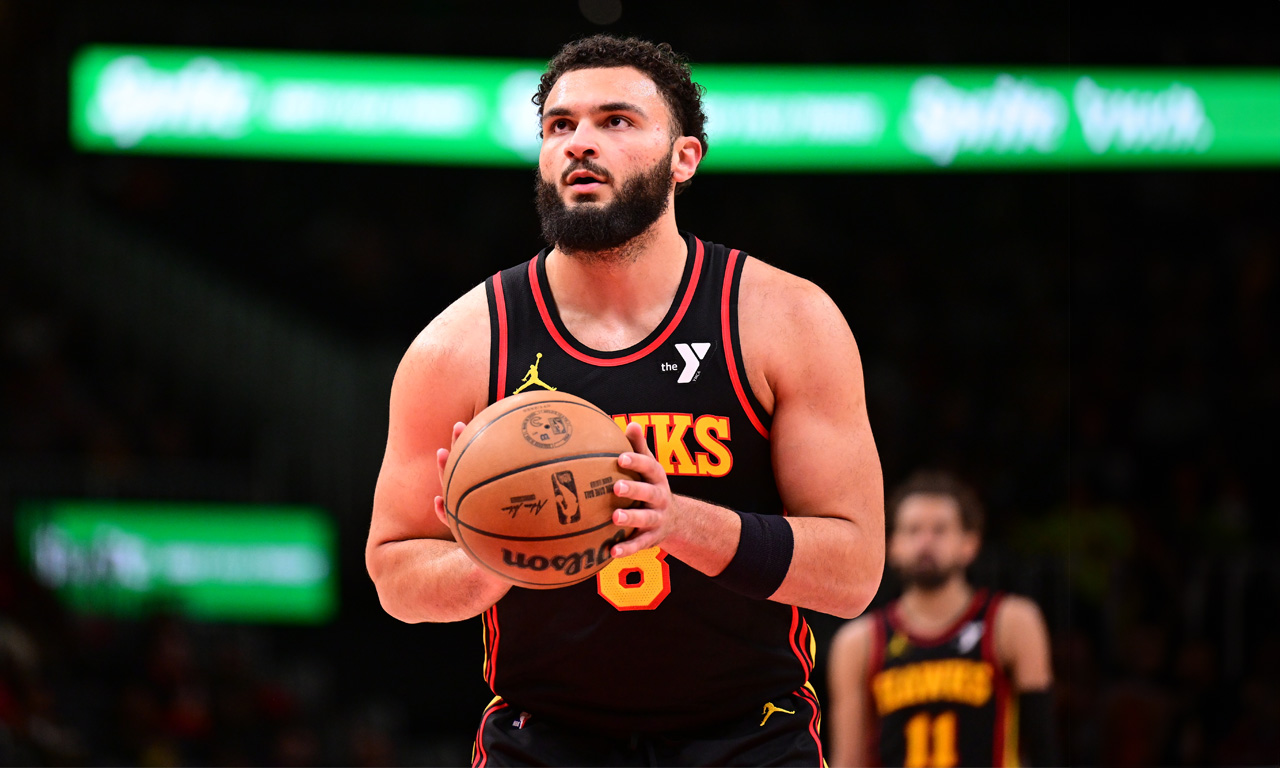
The Rockets made a move on Monday, signing former first-round pick David Roddy to a two-way contract.
The two-way spot opened up after the front office signed Jeenathan Williams to a standard four-year, $8.2 million contract (with friendly team options all along the way).
Roddy is 6-foot-5 and 250+ pounds but sports a 6-foot-11 wingspan. He was taken with the 23rd pick in the first round of the 2022 NBA Draft — six selections after the Rockets drafted Tari Eason. A standout in college, Roddy averaged 19.2 points, 7.5 rebounds, 2.9 assists, 1.2 steals, and 1.1 blocks per game during his junior season at Colorado State.
Roddy, who turns 24 later this month, is a physical player who can play multiple positions. He’s a solid rebounder for his size/position. He has played in 165 games over three seasons with the Grizzlies, Suns, Hawks and most recently Sixers, averaging 6.2 points and 2.9 rebounds per game.
The guard/forward has not shown efficient shooting, however — he’s a career 30.5% three-point shooter and just 68.4% from the line. His defense is better inside than out.
Ultimately, it will be those two things — three-point shooting and defense — that will determine his chances of carving out a consistent role in the league.
All in all, it’s a low-risk signing and the Rockets get a look at a prospect that fits their age timeline.
Houston Rockets
Houston a potential landing spot for Ben Simmons post-buyout?
Published
5 months agoon
February 6, 2025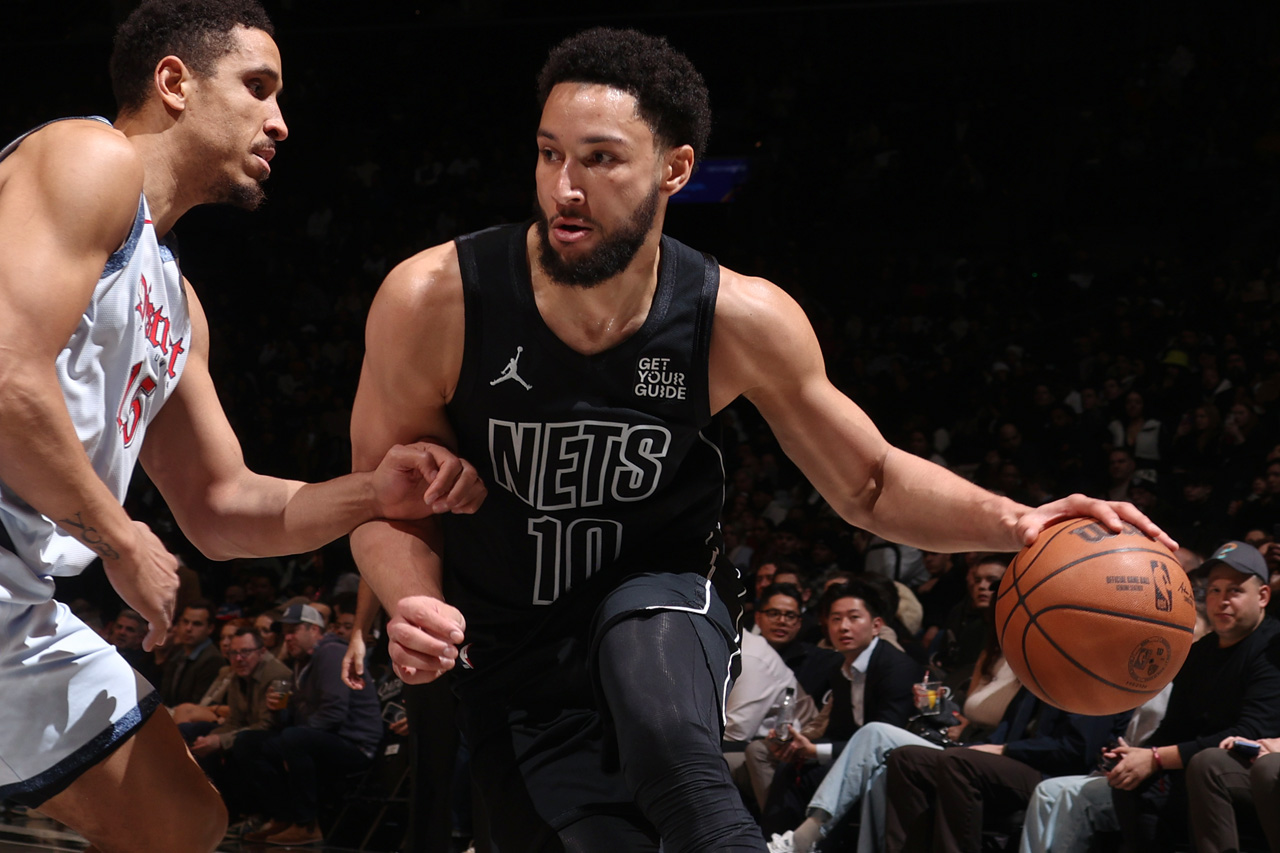
ESPN NBA analyst Brian Windhorst said on Thursday’s NBA Trade Deadline show that Brooklyn Nets forward Ben Simmons is working on a buyout and the Houston Rockets is a potential landing spot for him.
“Cleveland and Houston are two situations for Ben Simmons,” said Windhorst.
Brian Windhorst says the Cavaliers and Rockets are buyout locations for Ben Simmons.
Thoughts? pic.twitter.com/7ly4mvmxr5
— ClutchFans (@clutchfans) February 6, 2025
Advertisement
Rockets coach Ime Udoka was an assistant coach in Philadelphia in 2019-20 when Simmons was with the Sixers, before injuries took a significant toll. In fact, Udoka, when speaking about Amen Thompson earlier this season, brought up some comparisons to Simmons.
“The skill set is there, and it’s something that’s unique with his speed, athleticism, size, passing ability, and all those things,” said Udoka of Thompson. “I coached somebody, Ben Simmons, who had similar traits… as far as size and ability to push the pace, and find guys and finish. There are some similarities there.”
Both Thompson and Simmons are known for their elite athleticism, defensive versatility, and ability to create opportunities in transition.
However, can Simmons help the Rockets today? That’s the tough question.
Simmons has played in 33 games this season, averaging 6.2 points, 6.9 assists, 5.2 rebounds, 0.8 steals and 0.5 blocks in 25 minutes a night. He does not shoot threes (like, at all) — he has only attempted two threes in the past three seasons combined.
Ideally, he does not play in front of your young forwards of Amen, Tari Eason and Jabari Smith Jr. and on that basis alone, I think I would pass. But, Ime loves defensive dogs and he could use some extra ballhandling on the roster. You can see that there’s little in the way of offensive organization when Fred VanVleet is out.
There would be a comical full circle moment though if the Rockets did sign Ben Simmons, considering the Rockets were heavily criticized for trading James Harden in 2021 to Brooklyn instead of to Philadelphia for Simmons. The Rockets clearly made the right choice there.

